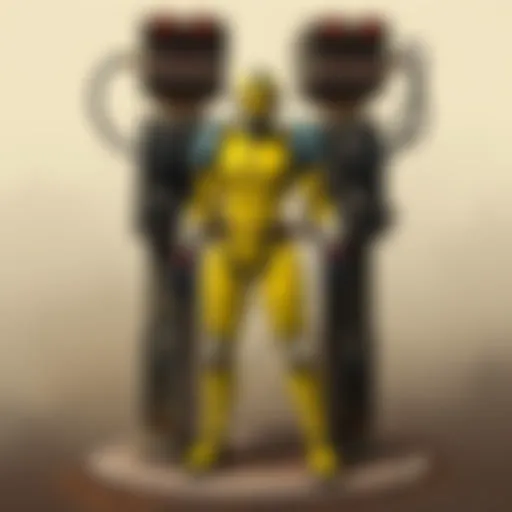Enclave Berkeley: Fallout Lore Meets Real-World Geography
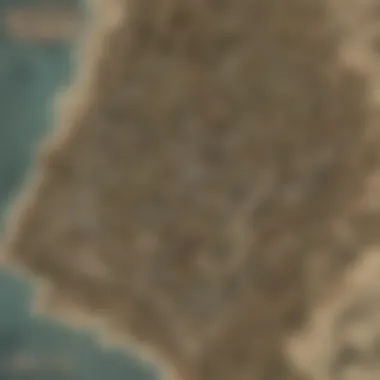

Intro
In the sprawling narrative of the Fallout series, few elements captivate the imagination as profoundly as the Enclave faction. Nestled within this lore is the intriguing concept of Enclave Berkeley, a reflection that extends beyond the pixelated landscapes into the physical realm of Berkeley, California. This intersection invites a deep dive, allowing enthusiasts and newcomers alike to grasp the blend of fiction and reality. Through this exploration, we will unravel the threads of Fallout lore, the significance of key characters, and historical episodes that shaped not only the virtual world but also resonate in our societal structures today.
Lore Insights
Overview of the Fallout Universe
The Fallout universe, a post-apocalyptic vision crafted with dystopian undertones, presents an alternate history shaped by nuclear war and societal collapse. The world, frozen in an era reminiscent of the 1950s, offers a unique setting where advanced technology coexists with ancient ideologies. A core component of this universe is the Enclave. The Enclave represents the remnants of the pre-war U.S. government, symbolizing ideals of elitism, control, and a return to perceived order.
Key Historical Events in the Fallout Timeline
To understand Enclave Berkeley, we must sift through pivotal moments in the Fallout timeline that created the backdrop for this narrative. Key events include:
- The Great War (2077): This global conflict left the Earth in ruins, leading to the establishment of various factions, including the Enclave.
- Formation of the Enclave: Born from the ashes of the pre-war United States government, the Enclave sought to restore the nation’s authority, often at the expense of the so-called "wastelanders".
- The Purge: Their objective often included eradication of those they deemed inferior, a point of contention that shapes much of their interaction with other factions.
These events not only frame the actions of the Enclave but also contextualize the societal dynamics that allow us to draw parallels with real-world Berkeley.
Deep Dive into the Backstory of Major Factions and Characters
Beyond the Enclave, other factions like the Brotherhood of Steel, the Minutemen, and the Institute reflect diverse philosophies and strategies for survival. Within this tapestry, character development plays a crucial role, shedding light on motivations and conflicts. The Enclave's leaders, such as President John Henry Eden, embody the struggle between authoritarian control and democratic ideals. His chilling rhetoric often mirrors historical leaders who justified oppressive practices under the guise of national security, inviting deeper analysis into the socio-political landscape of Berkeley.
Real-World Parallels and Socio-Political Ties
Berkeley, California, is steeped in its own unique history, rich with social movements and political ideologies. The city's anti-establishment sentiments during the 1960s resonate intriguingly with the Enclave's authoritarian approach. The juxtaposition of these two narratives can be seen as a reflection of ongoing debates around governance, moral authority, and societal hierarchies.
- The Free Speech Movement: A key historical movement that began in Berkeley challenged the status quo and advocated for civil rights. This inherently clashes with the Enclave’s dogmatic views, making the parallel all the more striking.
- Berkeley's Role in Social Justice: The city's long-standing position as a hub for activism mirrors the resistance against the Enclave’s oppressive tactics. This duality is essential for understanding how game lore engages with present-day issues.
End
As we navigate through the labyrinth of Fallout’s Enclave and its real-world reflection in Berkeley, the confluence of lore and geographical context sheds light on deeper questions of governance, power, and human resilience. By studying the roles and relationships within Fallout's universe, players can gain a richer understanding of both the game and its implications in actual socio-political environments. The intricate interplay between Enclave Berkeley’s fictional narrative and real-world history echoes far beyond gameplay, challenging us to reflect on the multifaceted nature of authority and resistance.
Preamble to the Enclave Faction
When discussing the bleak and intricate world of Fallout, one cannot overlook the significance of the Enclave faction. This group serves as a backbone to the series, embodying a complex interplay of ideology, authority, and survival. Understanding the Enclave illuminates not just the lore of the franchise, but also hints at larger themes about humanity’s struggle after catastrophe.
The Enclave is woven into the very fabric of Fallout's narrative; their origins and actions offer insights into both the fictional universe and real-world sociopolitical commentary. The faction is often portrayed as a remnant of the pre-war government, clinging to ideals of purity, control, and technological superiority, which raises pressing questions about morality, governance, and power dynamics in tumultuous times.
By examining the Enclave's development, players may discover fundamental aspects regarding governance, social hierarchies, and the consequences of idealism in a post-apocalyptic setting. Their pursuit of a 'better' world, albeit twisted, reflects the ongoing struggle between progress and ethical responsibilities.
"In the shadows of a devastated world lies the echoes of pre-war beliefs, where the Enclave's dreams of reconstruction clash with the harsh truths of survival."
To fully appreciate the narrative depth of this faction, one must delve into its origins and development and its role throughout the Fallout series—both of which are crucial in understanding how they intertwine with the historical and social context of places like Berkeley, California.
Berkeley: A Brief Historical Overview
Understanding Berkeley's historical background is crucial to grasp the rich tapestry of narratives woven into the Fallout universe, specifically regarding the Enclave faction. This city, home to a prominent university and a hub for progressive thought, stands as a testament to shifts in social structures, ideologies, and political landscapes. Its transition from a bustling college town to a critical stop in the post-apocalyptic landscape reflects not only in-game lore but also cultural and political dynamics that resonate with real-world themes.
Cultural Significance
Berkeley holds a notable place in American culture. It is widely recognized for its vibrant community dynamics, activism, and the fostering of innovative ideas. The history of the Free Speech Movement in the 1960s laid the groundwork for its reputation as a cradle of social change. This ethos of challenging authority and advocating for civil rights resonates with the Enclave's ideology, distinguishing it as an outlier within the Fallout universe. While the Enclave often epitomizes authoritarian control, their existence in a city known for protests and progressive movements creates a juxtaposition that enhances the narrative complexity.
More than just a setting, Berkeley’s cultural fabric influences the Enclave's portrayal. Events that transpired here can mirror the emergence of resistance against oppressive powers. The students and activists fighting for their rights can be likened to the struggles faced by factions seeking freedom in the Fallout series.
Political Landscape
Berkeley’s political landscape adds another layer of depth. The city has a history of influential lawmakers and policies that reflect changing governance paradigms. Its evolution from a center of academic authority to a stage of political upheaval mirrors the chaotic political climate of the Fallout world. The Enclave, characterized by elitist views and militaristic strategies, can be seen as a reflection of potential real-world power struggles.
The way Berkeley has historically resisted dominant political narratives is fascinating, as it embodies a fight against oppression, whether it was during civil rights movements or contemporary discussions around housing and community rights.
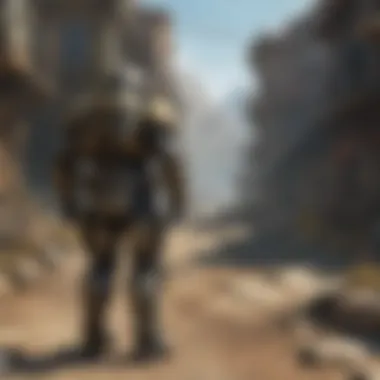

In this light, the Enclave’s actions become more than mere game mechanics. They symbolize greater societal conversations about authority, governance, and activism. Through the lens of the Enclave in Berkeley, we can explore pressing social issues that are relevant both in-game and in actual modern contexts.
"Berkeley is more than just a place; it’s a microcosm of social and political struggles, reflecting ideals that challenge authoritarianism—an essence that resonates deeply within Fallout's Enclave lore."
By examining the interplay of Berkeley's sociopolitical climate with the Enclave’s activities, the article reveals the multifaceted nature of this intersection between fiction and reality.
The Convergence of Fiction and Reality
In the context of the Fallout series, the convergence of fiction and reality serves as a compelling element that deepens the richness of the narrative. The Enclave, as a faction often depicted as a shadowy and authoritarian group, embodies certain historical and political realities that prompt players to consider the implications beyond mere gameplay. Understanding how these fictional elements echo the real world invites a critical examination of the motivations and actions of factions both in-game and in actual history. This connection adds layers to the storytelling, enriching the player's experience by encouraging a deeper engagement with the lore.
Enclave's Ideology and Real-World Parallels
The Enclave's ideology is rooted in elitism and the belief in a chosen few having the right to dictate the fate of the rest. This mirrors real-world supremacy movements that have thrived in various forms throughout history.
For example, one might draw parallels with organizations that advocate for a sort of "restoration" to a perceived golden age, often excluding certain demographics. In Fallout, this is evidenced by the Enclave's fixation on purifying the wasteland of mutated beings who do not meet their standards of what being human means.
Furthermore, their mantra of technology as a savior presents an uneasy reflection of today's world, where technological advancement consistently faces ethical scrutiny. When players encounter the Enclave in different Fallout titles, they’re not just battling a fictional enemy; they’re grappling with questions about power, control, and who gets to wield these tools in society. This relationship between popular culture and actual societal issues is critical, as it helps to open conversations surrounding these themes.
Exploration of Themes
Moving deeper into the themes represented by the Enclave, players can identify motifs of utopia vs. dystopia. The Enclave proposes a vision of a restored America, yet their methods often lead to destruction and suffering, prompting the inquire into the cost of such aspirations.
- Moral Ambiguity: The moral complexity surrounding the Enclave encourages players to consider the gray areas of right and wrong. As much as the Enclave represents a tyrannical force, their resolve to restore the country to what they see as its former glory is captivating and relatable to some. This brings to the forefront questions about sacrifice, leadership, and the ethics of intervention.
- Environmental Consequences: The game subtlety critiques technological hubris through the Enclave’s reliance on advanced weaponry and power. The environmental degradation of the Fallout world stands as a testament to the follies of neglecting ecological balances in pursuit of human ambition.
"In the end, the game's world is a reflection of our own, with all its triumphs and pitfalls. The narrative of the Enclave serves not just as a cautionary tale about power, but a mirror reflecting the intricacies of our own societal dynamics."
Ultimately, as players navigate the complexities presented by the Enclave, they engage with themes that are not merely confined to a pixelated battlefield but resonate with the real world's struggles and dilemmas. This intermingling of narrative and reality not only amplifies the depth of the game but heightens players' awareness of their own environment and the influences at work within it.
Key Locations in Fallout Featuring the Enclave
The Enclave, with its storied history and complex ideological stance, is central to the Fallout series’ exploration of power and survival in a dystopian world. The locations tied to the Enclave are not only pivotal to the gameplay but also reveal deeper narrative and thematic currents that resonate with real-world issues. These sites serve as stages for factional conflict, where the Enclave's technological superiority and moral ambiguity play out against the backdrop of a post-apocalyptic landscape.
Protected Areas and Bases
The Enclave’s protected areas and bases represent a significant aspect of its dominance in the Fallout universe. These locales, often fortified and secluded, symbolize safety and control. For players, these sites are not just dwelling points; they reflect the elite's attempt to preserve a semblance of civilization amidst desolation.
- The Enclave Oil Rig in Fallout 2: Here, the Enclave showcases its technological prowess. The oil rig serves as both a headquarters and a military base, illustrating the faction's reliance on pre-war advancements to maintain its agenda. The reclamation of oil serves as a metaphor for energy and survival in a world stripped of resources. It also poses a critique of corporate greed, suggesting real-world parallels between monopoly power and environmental degradation.
- Jameson's Secret Bunker in Fallout 3: This hidden location emphasizes the theme of secrecy and conspiracy. As players navigate this base, they confront ethical dilemmas regarding the use of military technology. The bunker, with its troves of classified information, raises questions about the ownership of knowledge and the implications of keeping power within a select few.
These bases are tightly interwoven with gameplay mechanics, offering missions that challenge players’ morality towards the Enclave's often merciless methods. Exploring these structures not only leads to unique loot but reveals a layered storytelling technique that intertwines action with philosophical quandaries regarding human nature.
Influence on Post-Apocalyptic Landscape
The influence of the Enclave on the broader post-apocalyptic landscape cannot be overstated. Their presence shapes faction dynamics and societal interactions, serving as a focal point for conflict among the surviving groups.
- Environmental Replication: The Enclave aims to replicate a pre-war world, seeking to restore a fabricated version of Earth that adheres to their elitist doctrine. Their reclamation projects often involve using technology to terraform and restructure regions, highlighting their desire for control over natural resources and lives, a stark reminder of how technological advancements can lead to environmental manipulation.
- Social Hierarchies: The sheer architectural and technological advancements found in Enclave-controlled areas set them apart from other factions, establishing disparities in power and resources throughout the wasteland. These contrasts create class struggles that draw parallels with contemporary themes of inequality, prompting players to reflect on the consequences of striving for progress at the expense of others.
In summary, the Enclave's locations in Fallout, from fortified bases to broader societal impact, serve as a lens through which players can explore complex themes. This analysis not only enriches the gameplay experience but also invites a contemplation of moral implications tied to power, technology, and the environment. As players engage with these sites, they are challenged to navigate a world fraught with ethical dilemmas and ideological battles, making their journeys meaningful within the game and reflective in the real world.
Character Connections to Enclave Berkeley
Understanding the intricacies of character connections within Enclave Berkeley prompts a deeper dive into the dynamic narratives surrounding the Enclave faction in the Fallout universe. The significance here lies not just in individual characters but in the way they embody the faction’s ideals and impact the storyline. Each character intertwines with elements that resonate with themes of power, morality, and survival, making them critical in shaping both the lore and gameplay experience.
Key Figures Within the Enclave
The Enclave, positioned as the remnants of the pre-war government, consists of several key figures that serve as embodiments of its principles and ambitions.
- President John Henry Eden: As a computerized embodiment of leadership, Eden represents the Enclave's desire for order and superiority over the wasteland's lawlessness. His idealistic vision often conflicts with the harsh realities that players encounter.
- Lydia: A soldier with a ruthless demeanor, Lydia showcases the Enclave’s militaristic and authoritarian tendencies. Her loyalty to the faction highlights the lengths to which individuals go for perceived justice and national pride.
- Enclave Scientists: The scientists, often masked and anonymous, symbolize the Enclave's obsession with technology and science as solutions to their problems. Their experiments and innovations push boundaries but often yield controversial moral implications.
Each of these characters underscores the complex narrative threads that connect Enclave Berkeley to players. By guiding players through moral dilemmas, they challenge the traditional notions of good and evil present in many narrative-driven games.
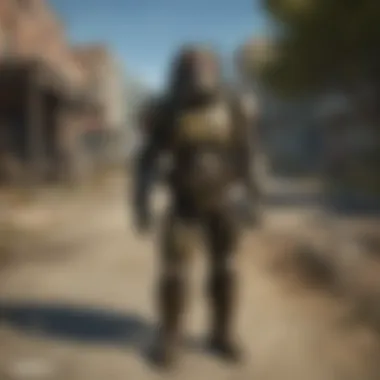

Interactions with Other Factions
The interactions between the Enclave and other factions create a rich tapestry of conflict and politics, enhancing the game's depth.
- Brotherhood of Steel: This faction stands in stark opposition to the Enclave's ideologies. The Brotherhood’s focus on preserving technology for the future contrasts sharply with the Enclave’s ambition of technological dominance. This rivalry illustrates classic themes of elitism versus egalitarianism, drawing players into a web of allegiance and betrayal.
- The NCR (New California Republic): The Enclave’s encounters with the NCR present ideological clashes on what governance should look like in the post-apocalyptic world. The NCR strives for democracy and inclusion, while the Enclave insists on a dictatorial approach, seen as a restoration of order. The narrative tension between these groups forces players to contemplate the merits of democracy versus authoritarian rule.
- Raiders and Other Faction Groupings: Interaction with raiders further complicates the landscape. The Enclave often views these groups as chaotic and beneath their notice, providing a stark illustration of their elitist mindset. This dynamic encourages players to consider how far they would go to achieve their ideals amidst lawlessness.
The multilayered character connections and faction interactions within Enclave Berkeley mirror the complexity of real-world socio-political dynamics. They weave a narrative that is both compelling and reflective of broader themes inherent in society. By engaging with these characters and factions, players can better appreciate the subtleties and implications of the story laid out in the rich world of Fallout.
Gameplay Mechanics Involving the Enclave
The Enclave faction stands as a pivotal part of the Fallout universe, and the gameplay mechanics associated with them enhance both the narrative and player experience. Examining these mechanics reveals much about the designs behind the game, shaping player engagement and fostering a deeper understanding of the faction's multifaceted role within the story.
Mission Structure
One of the most compelling aspects of interacting with the Enclave revolves around their mission structure. Players often find themselves entangled in a variety of quests that showcase the faction's ruthlessness and strategic depth.
For instance, the mission "The Follower's Cleanup" sheds light on the Enclave’s operational goals. Players are tasked with eliminating a rogue AI, reflecting the faction's commitment to controlling technology. This simplicity is deceptive, however, as choices made in this mission affect subsequent encounters with the Enclave.
The missions often include:
- Espionage: Players might need to gather intelligence on the Enclave's plans, creating a sense of tension and urgency.
- Combat: Engaging Enclave soldiers requires not only skill but understanding of enemy tactics, ensuring that players adapt.
- Moral Dilemma: These missions usually force players to confront ethical decisions that resonate beyond gameplay.
Through these structured missions, players are invited to experience the immediate dangers of the post-apocalyptic world, while also grappling with narrative-driven dilemmas that reflect the Enclave's ideology.
Decision-Making and Consequences
Beyond mission structure, the decision-making mechanics tied to the Enclave are monumental in shaping the gameplay experience. Fallout narratives thrive on player choice, and the interactions with the Enclave present pivotal moments that ripple through the in-game world. Every choice counts and has concrete repercussions that often feel as heavy as the future told in the Fallout lore.
Consider the choice to assist or oppose the Enclave during a critical junction in the storyline. If players choose to align with the Enclave, they may gain unique assets, increased firepower, and access to otherwise restricted technology. Conversely, siding against them might lead to intense hostility from the faction, manifesting in ambushes or dwindling resources. Here are a few key outcomes:
- Divergent Endings: Aligning with the Enclave could unlock exclusive missions that reveal more about their plans, while playing against them might lead to a complete breakdown in relations.
- World State Changes: How players engage with the Enclave can impact settlements, NPC dialogue, and even the final fate of key locations.
- Character Development: Decisions made influence how players are perceived. Allies may be won or lost based on loyalty to the Enclave.
Quote: "Your choices echo through time, shaping the wasteland even in ways unimagined."
This understanding of gameplay mechanics not only enriches the player’s journey but also reflects upon the very nature of power and morality that the Enclave embodies in the broader Fallout narrative.
Societal Commentary and Critique in Fallout
The Fallout series stands out not only for its post-apocalyptic world-building but also for its keen societal commentary. The spotlight on systems of government, morality, and the consequences of technology provides a fertile ground for analysis. In the context of the Enclave in Fallout, players grapple with the layers of manipulation, control, and the ethical implications of the faction’s choices. Understanding this societal commentary is essential to grasping the broader implications of the game's narrative and its reflections on real-world issues.
The Role of Science and Technology
In the Fallout universe, science and technology serve dual purposes. On one hand, they are portrayed as the architects of civilization’s fall. The Enclave, representing the pinnacle of pre-war science and military might, embodies the paradox of progress. The faction employs advanced technology to maintain power, often leading to devastating outcomes. Their attempts at genetic purity and the use of technology to control or eliminate perceived threats showcases a chilling side of innovation.
For instance, consider the Forced Evolutionary Virus the Enclave uses to get a foothold on supremacy. This manipulation of biological sciences reflects real-world debates surrounding genetic modification and the ethics intertwined with such advancements. The narrative pushes players to question whether technological advancements, while capable of great good, can also become instruments of oppression and tyranny.
Additionally, the depiction of research facilities—like those scattered across the Fallout map—mirrors contemporary issues like corporate control of scientific research and the moral dilemmas it entails. Players can find themselves questioning how technology can shape societies, for better or for worse, possibly drawing parallels to our reliance on tech in current life.
Environmental Concerns
Fallout is not merely a backdrop of urban decay; it serves as a stark reminder of environmental neglect. The setting, characterized by radiation and desolation, acts as a critique of unsustainable practices. The Enclave’s approach to environmental management—typically involving exclusion and destruction—reflects real-world issues concerning ecological preservation.
As players traverse the wasteland, they encounter mutated creatures and landscape degradation, reinforcing the idea of humanity's impact on the earth. This deterioration, brought on by past decisions, offers players a lens to evaluate modern environmental policies. Are we repeating history?
Moreover, the contrast between the Enclave’s technologically advanced ideologies and their impact on nature introduces a conversation about ecological ethics. The choice to control nature instead of coexisting with it is a theme resonating with environmental movements today, calling into question our ongoing struggles against climate change and habitat loss.
"Through the lens of Fallout, the Enclave’s actions paint a picture of a world that once was, and the choices that led there carry weight—echoes of real-life decisions that continue to challenge us."
In sum, the Fallout series, particularly the storyline involving the Enclave, serves as a conduit for exploring critical societal issues, emphasizing the intricate balances between progress and morality, as well as ecological sustainability. By situating these critiques within its gameplay and narratives, Fallout remains timely, urging players to reflect on their own world's challenges and the complex web of choices that shape it.
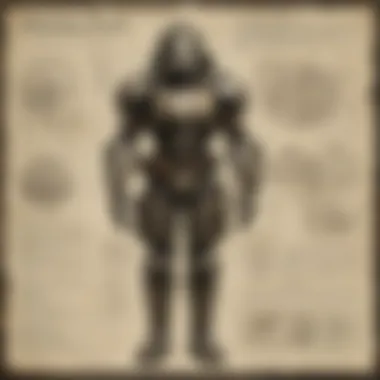

The Enduring Legacy of the Enclave
The Enclave, a faction steeped in controversy within the Fallout universe, has left a mark that reverberates through not only the lore of the games but also the minds of its dedicated fanbase. Its legacy is not merely a footnote in the game's history; it is a foundational element that shapes the narrative landscape of future titles. By understanding this legacy, players can appreciate how the Enclave influences gameplay mechanics, plot developments, and the philosophical discussions that arise from the series.
One cannot overlook the impact of the Enclave on subsequent Fallout titles. Each installation seems to draw threads from the original concept of the Enclave, perhaps to either refine its portrayal or challenge its ideals. The faction's stark ideals—rooted in a blend of authoritarianism and technocracy—often serve as a backdrop against which the struggles of other factions are measured. This creates a dynamic that keeps the Enclave relevant, no matter how many years glide by in-game or in reality.
Impact on Future Fallout Titles
The presence of the Enclave in games like Fallout 3 and Fallout 4 is a testament to its significance. For instance, the Enclave's persistence throughout the series illustrates a world where remnants of pre-war society continue to grapple with their historical baggage. By continually introducing them as antagonists, the designers provoke conflicts that resonate with current societal tensions. Players are drawn into a battle of ideologies where the very definition of humanity is questioned.
The upcoming installments have been hinted to carry forward this rich heritage. As fans churn through the possibilities of future plots, one often considers how the Enclave might portray new narratives about control versus freedom, the ethics of technology, and humanity's responsibility to its past. Whether the Enclave will appear in the next game or inspire new factions that mirror its tendencies remains a hot topic of discussion.
Influence on Fan Theories and Lore Expansion
The Enclave’s legacy goes beyond gameplay mechanics; it fuels fan theories that dissect and expand the Fallout lore. Online discussions, especially on platforms like Reddit, give voice to imaginative interpretations of the Enclave's role. Some theorize that the group might have unknowingly become a catalyst for factions like the Institute, forging a line between authoritarianism and perceived progressivism. This speculation allows players to engage with the materials at a deeper level, weaving their own stories into the fabric of the Fallout universe.
Interestingly, the way the Enclave operates has inspired various community-created content. Fans delve into possible histories of the faction, elaborate backstories for its key figures, and even map out potential future plots involving its resurgence. Through fan fiction, artwork, and forums, the Enclave continues to breathe life into the Fallout series.
In essence, the enduring legacy of the Enclave in the Fallout universe not only shapes gameplay experiences but also becomes a rich tapestry for storytelling and community engagement. Players not only battle the Enclave—they reflect upon it, ponder its implications, and, in turn, craft their own narratives that explore the depths of humanity and survival after the bombs have fallen.
Comparative Analysis: Enclave and Other Factions
Understanding the Enclave within the Fallout universe requires not just examining its distinct traits, but also placing it alongside other factions that populate this post-apocalyptic world. This comparative analysis highlights the rigid ideological framework of the Enclave relative to groups like the Brotherhood of Steel and the often anarchic nature of Raiders. It provides a deeper context for the Enclave's actions, motivations, and the central narrative conflicts that arise from their interactions with other factions. By classifying the Enclave amongst these groups, one can better appreciate its overarching themes of exclusivity, technological supremacy, and moral ambiguity.
Contrasts with Brotherhood of Steel
The Brotherhood of Steel and the Enclave stand at opposite ends of the ideological spectrum in many ways. The Brotherhood often takes a stance of preservation and sharing of knowledge, albeit with a heavy emphasis on technology. They believe in protecting humanity from its own destructive tendencies, and this manifests in their quest to gather technology. However, their methods can feel exclusionary; they exhibit selective camaraderie primarily with those who align with their values.
In contrast, the Enclave operates on elitism, asserting themselves as the rightful heirs to America's past. Their view of humanity is much harsher. They perceive the wasteland's denizens, particularly mutants, as inferior. The Enclave aims to restore the United States by any means necessary, even if that involves sanctioning genocide. Decisions often are cold calculations rather than moral dilemmas, which sets them apart from the Brotherhood's often more heroic, if flawed, ideals.
- Goals: The Brotherhood seeks to protect and preserve, while the Enclave seeks to control and eliminate.
- Membership: Brotherhood is more inclusive compared to the Enclave's tightly knit, authoritative hierarchy.
- Technology Use: The Brotherhood’s approach is more about safeguarding technology, while the Enclave aggressively weaponizes it for dominance.
This distinctive divide not only shapes the lore within Fallout but also speaks volumes about different attitudes towards power, control, and the legacy of humanity. In gameplay, players often find themselves at odds with the Enclave for their extreme policies, which contrast with the more nuanced morality of the Brotherhood's quests.
Comparison to Raiders and Other Groups
On the other hand, when contrasting the Enclave to Raiders and similar lawless factions, one can see that the relationship dynamics shift considerably. Raiders represent chaos and anarchy, usually existing in stark opposition to both the organized Brotherhood and the elitist structure of the Enclave. They thrive on a survival-of-the-fittest mentality, where strength is the main currency. The Enclave, while oppressive, does strive towards a semblance of order, albeit one rooted in a twisted sense of superiority.
- Morality: Raiders generally lack a coherent moral or ethical framework, while the Enclave operates under a twisted rationale of restoration and purity.
- Structure: Raiders are typically disorganized groups with varying purposes and leadership styles, contrasting with the rigid hierarchy of the Enclave.
- Resources: The Enclave thrives on technological superiority, which they leverage against the scavenging nature of Raiders, who often utilize brute force to claim resources through intimidation.
In the end, these comparisons expose the layers of complexity in the Fallout world. By exploring the intersections of motivations and beliefs, the player is invited to ponder not just the nature of factions but also the implications of their choices.
"In a world riddled with the remnants of civilization, every faction shows us a unique reflection of human nature, with the Enclave serving as a grim reminder of potential outcomes where power devoid of empathy prevails."
This stark analysis showcases how the Enclave's path illustrates the dangers of an authoritarian ideology, serving as a pivotal narrative element and a cautionary tale for players navigating the post-apocalyptic landscape.
The End
The conclusion serves as a vital element in understanding Enclave Berkeley's significance within both the Fallout universe and its relation to real-world contexts. It ties together the intricate threads of lore and geography, enriching the player’s experience while rooting the narrative in familiar landscapes. This final section allows for reflection on how the Enclave's actions deem the game’s moral complexities, pushing players to confront difficult questions related to power dynamics and governance.
Reflections on Enclave Berkeley
Enclave Berkeley encapsulates a unique blend of dystopian fiction and real-world geography. When one thinks back on the Enclave’s portrayal in the Fallout series, it is impossible to ignore the parallels with Berkeley, California. Historically, Berkeley has long been a center of activism and change, elements often mirrored in the Enclave's controversial decisions. Their quest for 'purity' and control resonates with real-life sociopolitical discussions that have pervaded Berkeley’s history. This intersection not only adds layers to the gameplay but also prompts players to ponder issues surrounding elitism and moral ambiguity.
"The question remains: what price do we pay for supposed progress?"
Innocuous yet uneasy decisions players face within Fallout’s gameplay mirror larger existential inquiries about leadership and community. The reflections we find in Enclave Berkeley serve not only as a backdrop for chaos but as fodder for dialogue and critique about our real-world socio-political landscapes.
Future Implications for Fallout Lore
Looking ahead, the legacy of Enclave Berkeley is likely to resonate in future Fallout titles. As development teams delve deeper into storytelling that reflects our times, the connections between in-game lore and actual events will only become more pronounced. The emergent themes of surveillance, control, and ethical governance found in the Enclave should remain central to narratives that confront the realities of modern civilization.
Furthermore, the impact this location has had on player expectations cannot be understated. Fans of the series are always on the lookout for deeper ties to our world, and as more players engage with the Fallout universe, their yearning for realism intertwined in fiction will only grow.
Enclave Berkeley may be fictional, but its implications cast long shadows on how we perceive structures of power—both in fiction and in our day-to-day lives. It’s not merely about survival in a post-apocalyptic world; it’s about understanding the moral stakes that persist in the age of fallout, both in-game and out.





